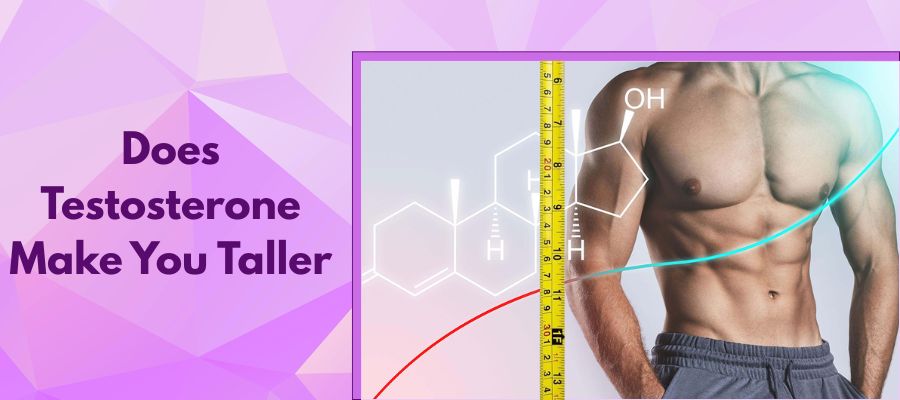ED Medication | Health and Wellness Blogs
Does Testosterone Make You Taller

People sometimes fret over height, especially during puberty. Many wonder if hormones like testosterone might help them to develop taller. You probably know that T level is the “male” hormone that aids boys to become men, but does it influence how tall someone becomes? More crucially, can more testosterone help you to grow?
Let’s examine this simply and naturally, no complicated scientific conversation, jus plain facts and useful observations.
What Is Testosterone?
Produced mostly in the testicles in males, testosterone is also found in lesser amounts in the ovaries of women. It causes several developments during puberty, including:
- Deepening of the voice
- Facial and body hair development
- Muscular growth
- Sex drive or libido
- density of bones
- And yes, growth in height
One naturally assumes that more T level results in more height. It’s not that easy, however.
How Does Growth Happen?
Your height is mostly fixed by your genes. That implies you will likely be tall if your parents are tall as well. Genetics is not the only influence; nevertheless, your diet, sleep, physical activity, and hormones have significant impacts as well.
Areas known as growth plates, which are situated near the ends of long bones (like your thigh bone), cause your bones to grow longer throughout childhood and adolescence. Cartilage makes these plates and remains open until you complete puberty.
Normally between ages 16–18 for females and 18–21 for males, you cease growing taller once the growth plates shut. Once that point is reached, your bones stop growing regardless of the amount of exercise, stretching, or hormones you take.
Does Testosterone Help with Height?
Yes—but only within a limited window of time, mostly during puberty.
The growth spurt seen in boys during their adolescent years is started in part by testosterone. Promotes the synthesis of insulin-like growth factor 1 (IGF1), both of which are necessary for bone development; also stimulates the discharge of another hormone known as growth hormone (GH).
Thus, although testosterone does not directly cause bone growth, it starts a series of events that promote height increase, but only when the growth plates are open.
What Happens If You Have Low Testosterone During Puberty?
Boys with low testosterone levels could find:
- late pubescence
- slower muscle growth
- Less body hair
- slower or stunted development
In these unusual situations, doctors occasionally recommend testosterone treatment, but always under close medical supervision. If their growth plates are still active, this can enable boys to close up in height as well as in other aspects of growth. increasing testosterone artificially when it’s not necessary may cause greater harm than good.
Can Testosterone Increase Height After Puberty?
Many people here are baffled. Nothing, including testosterone, will make you taller once your growth plates close. That’s the biological line. Having testosterone after this period won’t cause bone lengthening or open development plates.
Too much testosterone too soon may hasten the closure of growth plates, hence reducing your possible height. Doctors are thus quite careful while using hormonal therapies to treat kids.
What About Testosterone Supplements?
Online buzz surrounds testosterone booster pills Fildena 100 OR Fildena 150 mg, powders, injections, all ostensibly to make you stronger, more energetic, and yes, even taller.
most of these assertions are either greatly incorrect or somewhat overblown.
While natural testosterone boosters (such as specific herbs or vitamins) might somewhat improve energy or mood in older people, they won’t affect your height, especially if your body is already producing enough testosterone on its own.
Unless you have a diagnosed medical condition, your body already knows how to regulate hormone levels safely.
Natural Ways to Support Growth During Puberty
Here are some natural, hormone-friendly advice if you’re still growing and want to help your maximum height ability:
Eat a well-balanced diet.
Support hormone balance and bone health by feeding your body calcium, protein, vitamin D, zinc, and other nutrients.
Enough Sleep
When one is in deep sleep, growth hormone is produced. Teenagers should aim for 8–10 hours every night.
Work out frequently.
Activities such as swimming, yoga, stretching, and resistance training can help to maintain good posture, muscle tone, and general well-being.
Lower Stress
Hormones and health can be adversely affected by chronic stress. Be active, exercise mindfulness, and engage in activities that calm you.
Avoid Steroids and Artificial Hormones
Particularly in teenagers, using uncontrolled testosterone supplements or anabolic steroids can be harmful. They can cause hormone imbalances, organ damage, and stunted development.
When should you see a doctor?
Teenagers not growing as expected or those whose puberty seems delayed should feel free to speak with a doctor. Using X-rays, they can examine your growth plates and undertake hormone tests. Treatments are available should there be a problem.
Remember, though: attempting to “hack” your hormones without direction might backfire.
Bottom line
If your body is still developing, testosterone can help you become taller—but only then.
Your height is set once your development plates close and puberty is finished. Using testosterone at that stage could have significant health hazards if abused; it won’t increase your height.
Concentrate on what you can control: nutritious eating, regular exercise, good habits, and enough sleep, rather than chasing fast solutions. These organic techniques help your hormones and increase your chances of achieving your full height.
inches do not define your value. Confidence, compassion, and personality travel much farther than height could ever reach.

